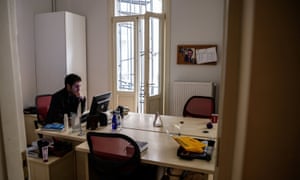
Turkish authorities have shut down 15 media outlets, including one of the world’s only women’s news agencies, and detained the editor-in-chief of an opposition newspaper, in the latest crackdown since a coup attempt in July.
The Cumhuriyet editor-in-chief, Murat Sabuncu, and other executives from the paper were detained in raids early on Monday morning on accusations that they committed crimes on behalf of Kurdish militants and a network linked to the US-based cleric Fethullah Gülen, the Istanbul prosecutor’s office said.
Gülen is blamed by the Turkish government for the attempted putsch.
An emergency decree issued late on Saturday ordered the shutdown of 10 newspapers, two news agencies and three magazines. Most of the media organisations that were closed had head offices in the predominantly Kurdish south-east. A further 10,000 civil servants have also been sacked.
The decree brought the total number of media outlets closed since July to __more than 160.
“The police came around 4am on Sunday morning and sealed the office,” said Beritan Canözer, a journalist in Diyarbakır for Jinha, the news agency staffed entirely by women. “We have not received a court order. There have not been any official justifications for this measure. Nobody explained anything to us.”
Canözer, who was detained last December while reporting on a demonstration in Diyarbakır because police decided she looked “too excited”, underlined that the shutdown would not spell the end to Jinha’s work. “We will find other ways to inform the public,” she said. “We will continue to report … They cannot silence us.”
Rights groups have harshly criticised the recent crackdown on press freedom in Turkey.
According to independent media platform P24, 99 journalists have been formally arrested since the botched military intervention, turning Turkey once again into the world’s leading jailor of reporters. Thousands of journalists have lost their jobs. Hundreds of government-issued press accreditations have been cancelled, and an unknown number of journalists had their passports revoked, thus banning them from all foreign travel.
Almost 2,000 academics and teachers were also among those sacked via the emergency decrees, many of whom were members of the leftist teachers’ union Eğitim-Sen.
A state of emergency, announced on 20 July, has recently been extended for another three months until January. The measure allows President Recep Tayyip Erdoğan and the AKP cabinet to bypass parliament, rule via decree, and suspend rights and freedoms as they deem necessary.
According to state-run news agency Anadolu, __more than 37,000 people were formally arrested. Around 100,000 more civil servants were fired or suspended during recent purges.